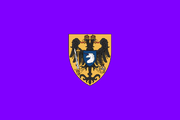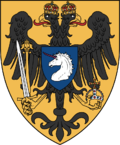Haifa: Difference between revisions
No edit summary |
|||
| Line 51: | Line 51: | ||
==History== | ==History== | ||
Haifa was founded over the course of several decades by serial migratory waves of Hammish citizens from the state of Anglia and Israat along the shores of Lake Morovia. During their migration, they came into contact with several indigenous groups to the area, which led to their mixing over several generations and creating a distinct Haifan culture. It became an independent state called the Free State of Haifa under the leadership of its first Prime Minister, Herman Wozhleweitz. | Haifa was founded over the course of several decades by serial migratory waves of Hammish citizens from the state of Anglia and Israat along the shores of Lake Morovia. During their migration, they came into contact with several indigenous groups to the area, which led to their mixing over several generations and creating a distinct Haifan culture. It became an independent state called the Free State of Haifa under the leadership of its first Prime Minister, Herman Wozhleweitz. | ||
===Free State of Haifa=== | |||
During its founding years, Haifa was mainly an agricultural nation. That changed when enormous deposits of diamonds and other gems south of the city of Abeis. Under the leadership of its second Prime Minister, George Perlman, the Free State built a thriving banking and finance sector as the economy liberalized and the economy became flush with the proceed of economic growth and mining. | During its founding years, Haifa was mainly an agricultural nation. That changed when enormous deposits of diamonds and other gems south of the city of Abeis. Under the leadership of its second Prime Minister, George Perlman, the Free State built a thriving banking and finance sector as the economy liberalized and the economy became flush with the proceed of economic growth and mining. | ||
| Line 62: | Line 64: | ||
* Closing Years, Collapse of the Free State | * Closing Years, Collapse of the Free State | ||
===Haifa as part of Hamland=== | |||
===Hammish Civil War=== | |||
''See also: [[Hammish Civil War]].'' | |||
===Rise of Haifan nationalism=== | |||
==Geography== | ==Geography== | ||
Revision as of 04:41, 16 September 2018
 Flag | |
 Coat of Arms | |
| Motto: | "Veritas nos elegit" (Truth Chose Us) |
| Capital | Abeis |
| Largest Cities | Keybir-Aviv, Lewisburg, Melusinia |
| Official Languages | Common Tongue, Haifan, Alexandrian Fransch, Wechua |
| Demonym | Haifan |
| Government | The Government of the State of Haifa |
| Head of State | HM Elizabeth I |
| Head of Government | Governor Rachel Dresner (NSP) Unionist Coalition Government (NSP-NUP-LL)
|
| Legislature | The Haifa State Assembly |
| Population | 27,045,778 (1663) |
The state of Haifa is the third largest state in the Kingdom of the Union of Caputia by population. Being the easternmost state in the Kingdom, it is in central Keltia, along the Straits of Haifa. Haifa shares borders with the Caputian states of Morovian-Patrovia to the north, San Luis to the west, while the rest of the Haifan border is to the Keltian Green or the Straits of Haifa.
Abeis is the most populous city in Haifa and among the largest in Caputia, while Keybir-Aviv is second-most populous in the state. Other major cities include Lewisburg and Melusinia. Haifa is nicknamed "The Free State" to signify its former status as an independent republic and as a reminder of the state's struggle during the Hammish Civil War.
Historically four major industries have shaped the Haifan economy: diamond mining, agriculture, banking and finance, fishing, and technology. With a growing base of industry, the state leads in many industries, including agriculture, jewelry, computers and electronics, aerospace, and biomedical sciences.
Etymology
There are two main hypothesis of how the name Haifa came about. One hypothesis is that the name relates to the Haifan (Hebrew) root, CHFA, which means “to cover, to hide”, perhaps because of Lake Morovia being "hidden" in the middle of the Keltian continent. Another interpretation links the name with the word CHOF, beach, or “beautiful beach.”
History
Haifa was founded over the course of several decades by serial migratory waves of Hammish citizens from the state of Anglia and Israat along the shores of Lake Morovia. During their migration, they came into contact with several indigenous groups to the area, which led to their mixing over several generations and creating a distinct Haifan culture. It became an independent state called the Free State of Haifa under the leadership of its first Prime Minister, Herman Wozhleweitz.
Free State of Haifa
During its founding years, Haifa was mainly an agricultural nation. That changed when enormous deposits of diamonds and other gems south of the city of Abeis. Under the leadership of its second Prime Minister, George Perlman, the Free State built a thriving banking and finance sector as the economy liberalized and the economy became flush with the proceed of economic growth and mining.
- Prime Minister Ismael Todochev
- Afrikaans immigration
- Subsequent Prime Ministers
- Closing Years, Collapse of the Free State
Haifa as part of Hamland
Hammish Civil War
See also: Hammish Civil War.
Rise of Haifan nationalism
Geography
Climate
Administration
Demographics
Economy
Tourism
Culture
Education
Sports
Infrastructure
Healthcare
Media
| Political divisions of Caputia | |||||||
|---|---|---|---|---|---|---|---|
| |||||||
 | |
| Official language | English |
|---|---|
| Capital | Abeis |
| Largest cities | Abeis, Keybir-Aviv, Jezeraah |
| Forum | Forum |
| Number of citizens | 9,527,179 |
| Date founded | July 11,2012 |
| Government | Free State |
| Current leader | Ismael Todochev |
| Currency | Lliev |
Haifa is an small nation situated in the east of Keltia, situated in eastern Micras. The capital, Abeis, is also the largest city in the nation. There are two other major cities in Haifa, Keybir-Aviv and Jezeraah.
History
Haifa was founded by fleeing Israat immigrants in 1970. However, many remains such as the Luxor Palace and Bungaÿo Shrine were left over from past feudal nations. In 1974, the first Prime Minister was elected. Herman Wozhlweitz, the first Prime Minister, established the basic principles of government for the nation. Haifa was relatively an agricultural nation until 1990, when diamond was first discovered south of Abeis. Around this time banking became another dominant economic force, and the country moved itself to a more capitalist and industrial economic scheme. In 2001, Haifa gained control of the Fenkel HQ, and 2007 saw a mass refugee movement of immigrants from Afrikaana arriving in the Northern Isles and Southern towns. In 2013 the nation gained two new territories, Walstadt and North Antarctica. Currently, the Prime Minister is Ismael Todochev, and the economic Haifa plays a major role in the Diamond and Banking industry of the region.
Geography
Haifa is a small nation, lying on the Maccabi River. The country is to the east of Lake Morovia. It is generally a flat country, with various hills spotting the countryside. Even though it is inland, the nation is generally considered a seafaring nation, as the water is a big helper to the economy, tourism, and the lifestyle of the people.
Regions
Other than mainland Haifa, there are also three protectorates and one territory.The regions themselves are split into cities and townships. and they are in close proximity of each other.
| Province | Capital | Population |
|---|---|---|
| Abeis | 104,136 | |
| Minab Azis | 20,127 | |
| Wallis Island | 862 | |
| Fenkel Shipping Co. HQ | 50 | |
| Wahlstadt | 47,927 | |
| New Livingston | 9,502,002 |
Government
The country is currently head by Prime Minister Ismael Todochev. The main legislative body of Haifa is the Parliament, which is comprised of city officials and governors from every region. The only elected official is the Prime Minister, who serves for three month terms. He appoints city officials and other government positions.
Military
The military of Haifa is proportionate to the size of the country, and only has about 2,000 full-time personnel. The Special Haifan Forces are the premier task force group in the nation.
Economy
Haifa's economy is made up of a large mining, shipping, banking, and research sector. The nation is one of the leaders in the diamond industry, and has research facilities around the country, especially in Keybir-Aviv. Many foreign companies set up offices in the Abeis Business District, with the country having a diverse economic sector. The nation is part of the SCUE, with Haifan Companies being traded on the Ham50, the stock market of Hamland. Recently, fishing and tourism have grown as economic sectors in the country.
Infrastructure
The cities of Haifa are connected by the four major highways, H1-H4. There are many other smaller regional roads that interconnect the many villages and towns. The Haifan Rail is the major train line in the nation.
Airports
The nation's largest airport, Haifan International Airport, located in Abeis, has flights all across Micras. The secondary airport is Keybir-Aviv International, which is considerably smaller than it's sister airport.
Education
With the country having a 96% literacy rate, education is mandatory from ages 5-18. The country's top university Haifa National University in Abeis attracts many foreign students to its campus.
Culture
Haifan culture is very complex, with many ethnicities making up its diverse societies. Ethnic Haifans bring most of their customs from their ancestors in the Israat region of Hamland. These include food, traditions, and sport. There is a large Afrikaanian minority that has sprung up a following of their native religion, Gorogoro. Also, the language of DakaÏuru is spoken between these people. The mesh of these two ethnic groups has brought different traditions, such as the annual Festival of Union, the celebration to mark the day when Haifans accepted the Afrikaanian refugees into their country. The main sport in Haifa is football, with the Haifa League 1 being the premier division. The cuisine in Haifa is very diverse, as the Haifan, Afrikaanian, and other foreign nationalities' tastes have mixed into a melting pot of flavors.